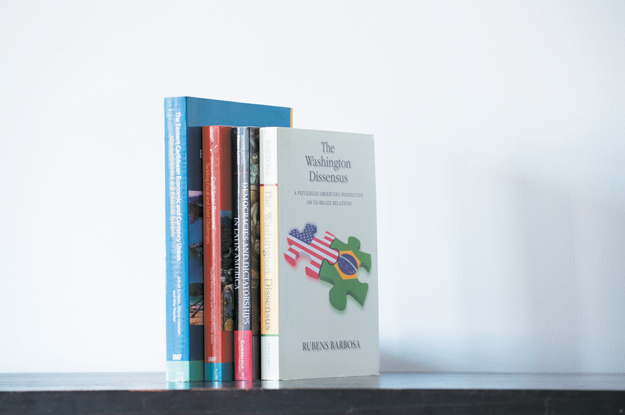Brazil is little understood or appreciated in the United States. The lack of knowledge about the world’s seventh largest economy—and the second largest democracy in the Western Hemisphere—is particularly evident in Washington beyond a small circle of “Brazil hands.” When the subject of Brazil comes up at all in Beltway policy circles, it is usually discussed in the context of a nonthreatening friend who shares a worldview and interests similar to the U.S., along with a persistent wish to see Brazil play an even greater role in international affairs, and as a moderating influence across the region.
But Brazil, as Rubens Barbosa makes clear in The Washington Dissensus, has a different view—both of its own role in regional and global affairs, and its relationship with the United States. Barbosa, who capped a distinguished 40-year career in Brazil’s foreign service with a stint as ambassador to Washington from June 1999 to April 2004, traces the evolution of his country’s diplomacy toward the U.S. from what he describes as the traditional, work-within-the-system approach of President Fernando Henrique Cardoso’s administration to the more strident diplomacy pursued by the Luiz Inácio Lula da Silva government.
Barbosa, now retired from government and freer to speak his mind, is generally critical of the change in Brazil’s foreign policy priorities. This makes his account even more compelling to U.S. policymakers who may regard Brazil with blinkered eyes. He writes, “U.S. policy toward Brazil is still based on blurred visions, myths, stereotypes, and distortions of reality.”
What makes Barbosa’s book especially authoritative is that he was on the inside during a pivotal period in the bilateral relationship. During his tenure, Barbosa was a key interlocutor for the governments of both Cardoso and Lula—a period that spanned the 9/11 attacks, the beginning of wars in Afghanistan and Iraq, the Quebec City Summit of the Americas, and the cratering of negotiations for a Free Trade Area of the Americas, among other events—all of which he discusses in his book.
Moving effortlessly between discussions of policy and grand national strategy to tactics and the day-to-day role-playing of an ambassador, Barbosa reviews the tectonic political shifts occurring in each nation and how they impacted the bilateral relationship, while detailing his efforts to operate effectively as Brazil’s top representative in Washington. The high point for him was clearly the period when President Bill Clinton and Cardoso’s administrations overlapped, after which the “tone and content of the bilateral relationship would never be the same again,” and when “fundamental differences” were “resolved without much ado.” The advent of the George W. Bush administration in 2001 and Lula’s administration in 2003 recast the bilateral relationship. Despite the genuine personal relationship that the two leaders shared, Brazil’s shifting foreign policy priorities, coupled with Washington’s lack of regional focus and understanding, led to a hardened and divergent policy environment. As ambassador, Barbosa writes, he was unimpressed with the level of knowledge about Brazil he encountered in the capital (including among other members of the Latin American diplomatic community).
Much of the book focuses on the handful of meetings that occurred between the respective presidents. This reveals—perhaps unintentionally—Brazil’s limitations in its approaches to Washington. Unlike other Latin American countries, Brazil tends to focus primarily on official diplomatic channels, thus neglecting or downplaying the many informal channels of influence and access that Washington famously provides. For example, Barbosa is dismissive of the role of the private sector as a pressure point in advancing the bilateral agenda, calling the U.S. private sector “ignorant” of Brazilian realities. He also appears to overlook the importance of direct, consistent engagement with Congress beyond the largely symbolic role of the Brazil caucus.
The book might also have benefited from a stronger editor. The title is a too-clever effort to separate Brazilian policy from the clichéd “Washington Consensus,” but in English, the term “dissensus”—which he uses “to describe the many divergences between the United States and Brazil in particular, and Latin America in general”—is virtually unknown. The book also suffers in places from needless repetition, and the overall tone is tainted by unnecessary personal attacks against a number of U.S. officials who served contemporaneously. More seriously, it includes several factual errors that mar the overall impression and may mislead the reader. To highlight one of several: Louisiana Congressman Bill Jefferson, who was convicted of public corruption in 2009, was a Democrat, not a Republican. This is an important fact because Jefferson was one of only a handful of protrade Democrats, and his 2008 defeat (while he was under indictment) set back efforts to expand the hemispheric trade agenda.
Nonetheless, Barbosa’s book offers valuable insights into Brazilian foreign policy toward the United States. He is especially critical of the overt politicization of Brazil’s foreign policy under the Partido dos Trabahaldores (Workers’ Party—PT). Tellingly, he quotes a 2010 PT congressional document: “Objectively, the foreign policy of the Lula government sees Brazil as competing with the United States” and of “immense geopolitical importance,” with the “potential to become a threat to the U.S. over the medium term.”
This is not the benign view of regional and global partnership that most U.S. policymakers have today toward Brazil, and Barbosa’s interpretation helps to explain several significant misunderstandings between Washington and Brasília in recent years. For example, he writes that Brazil’s effort to build a “strategic” partnership with Iran was a “grave error” that set back bilateral relations significantly and severely damaged Brazil’s standing in influential circles in Washington. He also believes that Brazilian efforts to apply an “inverted version of the Monroe Doctrine”—working to exclude the U.S. from the hemisphere while enfeebling the Organization of American States—among other actions, has contributed to “unnecessary attrition with Washington.”
His bias is clear: “I am convinced that our most important bilateral relationship remains the one we share with the United States. Views that contend otherwise belong to the domain of rhetoric and prevent us from maximizing the benefits Brazil could draw from a solid relationship with this country.” I share these views, and Barbosa’s important insights can helpfully inform those both inside and outside Washington who seek to engage with Brazil, as well as those who simply seek to know more about this fascinating and glorious, yet often diplomatically frustrating, country. With books like The Washington Dissensus, we can begin to address the very real and lamentable deficit of understanding and appreciation of Brazil that even now continues to exist within the United States.






